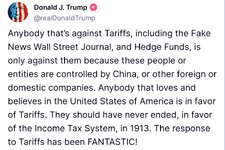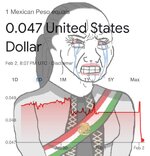I saw a Trump speech yesterday where he explained his logic behind the tariffs. According to the president, in the late 19th century, the government was funded mainly through tariffs and the economy was in general far stronger than it has been since the introduction of income tax in 1913. Also, China, Canada, Mexico, and others have been somehow taking advantage of the US for a long time due to unfair trade deals, or something to that effect and the tariffs are supposed to somehow fix this. I don't know the details. Anyway, the president promised his tariffs would lead to a new golden age where we're all going to be "very, very rich" here in America.
All of that sounds good to me, if it's true. I like money </Frito Pendejo from Idiocracy voice>.
Then this morning I saw a headline in the MSM saying that Canada and Mexico are planning retaliatory 25% tariffs on the USA. Should we be worried? A lot of the avocados I buy seem to be grown in Mexico, and maybe the Canada Goose jacket I've always wanted but never been able to afford will be even more ridiculously expensive now. Other than that, I have no idea.
Obviously, I don't know much about tariffs and how they work, either in theory or in practice. If there's already a thread for tariffs or they're being discussed at length somewhere else someone please point me to that thread or discussion, but I couldn't find anything so I thought I'd start this thread. I'd like to hear your opinions.
All of that sounds good to me, if it's true. I like money </Frito Pendejo from Idiocracy voice>.
Then this morning I saw a headline in the MSM saying that Canada and Mexico are planning retaliatory 25% tariffs on the USA. Should we be worried? A lot of the avocados I buy seem to be grown in Mexico, and maybe the Canada Goose jacket I've always wanted but never been able to afford will be even more ridiculously expensive now. Other than that, I have no idea.
Obviously, I don't know much about tariffs and how they work, either in theory or in practice. If there's already a thread for tariffs or they're being discussed at length somewhere else someone please point me to that thread or discussion, but I couldn't find anything so I thought I'd start this thread. I'd like to hear your opinions.


